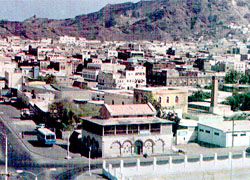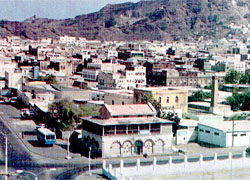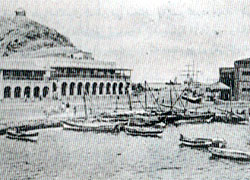
Aden, 1839-1967 [Archives:2000/51/Reportage]
December 18 2000
Ridhwan AlSaqqaf
Aden Bureau Chief
The historical city of Aden (Carter) was well-known as an important international port considerably boosting the trade activity at the time. It also played an important role in connecting nations not only commercially but also culturally. That was all attributed to its strategic location in the middle of international ports of producing incense. This port becomes more important as Aden at present possesses an international container terminal fully equipped with all facilities needed.
Aden historical and old port is located to the west of Mount Seerah on which there is a very famous fort named after it. The anchorage of this port extends from Seerah to al-Manssori mountains. In the course of time, most of the port area got dumped that now there is not much left of it, while it was an important anchorage for ships away from the high and strong sea waves.

Aden used to be one of the richest Arab cities with a history extending for more than three thousand years. It was mentioned in the Old Testament. In fact it was known about through the Phoenicians during those ages in Palestine and was called in Hebrew Eden. Aden remained for long during the old kingdoms the main port of Yemen. It was the main port with no other ports nearby except those of Qana port in Shabwa and Muzaa port.
British Occupation Of Aden
After the occupation of Aden, British control strengthened over the city strongly putting down any struggle and resistance to defend the city by the people. Then, they tried to extend their control over the South of the Arab peninsula. Sir Heiter was the first British ruler in Aden who pulled out all the stops to make strong and close relations with tribal chiefs at the time including al-Hushi, al-Akrabi, al-Azaibi, etc. All these tribe leaders agreed on signing a peace accord with Britain. As in exchange those leaders remained in their positions helping putting down any opposition to the British control.
Why Colonizing Aden?
One of the main reasons is that Britain wanted to have a strategic location in the region standing against Mohammed Ali in the Arab Peninsula and to have control over the international navigation routes through Aden Gulf and Red sea. Another reason was that Britain wanted to restrict the Egyptian control in the Red sea after the Egyptians had had sovereignty over the Arab Peninsula. The British occupation was conducted after Mohammed Ali was opposed in London Conference in 1840 by the international policy and was ordered to withdraw his forces from the Arab Peninsula. After bowing to those orders and Mohammed Ali forces were withdrawn, Britain found it a chance to extend its control on the south of Yemen.
British Government Policy in the South of Yemen:
After controlling the city of Aden, the British government applied the wait and see policy; it did not intervene in conflicts among tribes surrounding Aden. It dealt with these tribes according to its interests winning their support by some rewards and allowances paid to sheikhs of these tribes and signing loyalty and friendship treaties.
When Sultan Muhsen al-Abdali died, his son, Ahmad bin Muhsen bin Fadl al-Abdali came to power and had an effective role in opposing the British occupation. However, he gave up to the British control and became an ally until he died in 1849. Then, his brother Sultan Ali Muhsen Fadl al-Abdali took power and was reputed for his shrewdness and cunning nature. He showed that he was supporting the Britishers meanwhile he did his best to instigate the neighboring sultanates against them. Then, the colonizers made a friendship treaty with him in 1849.


Resisting the British colonization in Aden:
Since the British colonization of Aden, Arab disturbances against Britain were at a peak, especially after signing the treaty with Sultan Ali Muhsen al-Abdali. Many clashes took place in Arab areas occupied by Britain. The Arabs strong opposition was marked in 1850 when many operations were conducted against the British colonization of Arab countries, consequently complicating relations between Arabs and Britishers.
In 1945, Sir Coglan was appointed political resident in Aden. In that time Sultan Ali Muhsen al-Abdali, Lahj Sultan, maintained a good relation with the Britishers as well as expanded his relations with al-Fadli, al-Akrabi tribes. They started blocking roads and confiscating supplies bound for Aden. As Coglan could not afford the war expenses with these tribes, he tended to establish direct relations with Yemeni tribes neighboring Aden so as to support and protect the British interests in the area. He succeeded in that with the lower and upper al-Awlaki tribes, guaranteeing their loyalty to him and not to the al-Fadli tribes against Sultan Ali. He also forced other tribes by military ways to establish relations with Sultan Ali of Luhj.
In 1857, new turns were witnessed in relations of Sultan Lahj and British government in Aden. Following his brothers visit to the British Political resident in Aden, Sultan Ali got angry with Sir Coglan, and consequently a group of pilgrims whose ship was wrecked in the Gulf of Aden were looted by the Abadilah in Sheik Ottoman.
All that caused the relations between the British authorities in Aden and al-Fadli and al-Akrabi tribes to deteriorate. As a reaction to that Sultan Ali started creating problems for the Britishers through conspiracies and plots. Sir Coglan attacked the Sultan and destroyed his castle in 1858, until Sultan Ali surrendered and peace came back to the area after that.
After Sultan Alis death, his brother Fadel Musen succeeded him and soon began helping the British in creating stability in the area and to extend their influence throughout the region. In fact at that time the British bought Adens peninsula (little Aden) from the Alaqarib tribe in 1869 for 30,000 rials added to which 3000 rials handed to the sheik of the tribe, by the new political representative Sir Edward Sall.
The British settled in Aden after that completely as well as in the surrounding area in south Yemen and the strait of the red sea.
——
[archive-e:51-v:2000-y:2000-d:2000-12-18-p:./2000/iss51/report.htm]


